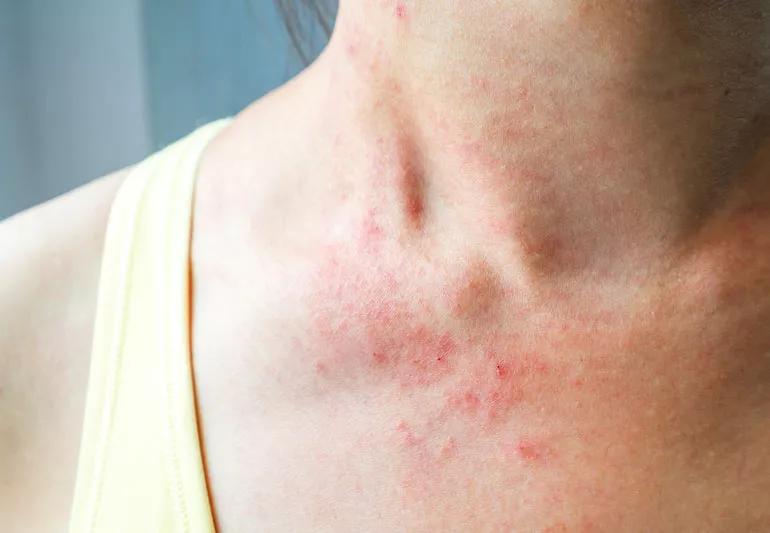Know whether you need a dermatologist or primary care doctor

Image content: This image is available to view online.
View image online (https://assets.clevelandclinic.org/transform/4616d041-0e53-4975-bb1b-f618baf7d8ef/skinRashDoc-922607396-770x553-1_jpg)
skin rash on neck
From poison ivy to severe acne, figuring out which specialist to go to may be tricky, especially if it’s urgent. Sometimes it’s difficult to get in to see a dermatologist quickly, so in the meantime, should you go to or video call your primary care physician instead?
Advertisement
Cleveland Clinic is a non-profit academic medical center. Advertising on our site helps support our mission. We do not endorse non-Cleveland Clinic products or services. Policy
“Your primary care doctor can likely handle most simple things,” says dermatologist Anthony Fernandez, MD, PhD. “However, if you suspect a more serious problem, it’s important to find a dermatologist.”
“You should definitely see your primary care provider first for simple, common skin problems,” says Dr. Fernandez. “That’s the best place to start.”
Anything with a systemic component, or something that affects a significant percentage of the body, should be seen by a dermatologist to get an answer quickly. Primary care doctors can treat mild acne, rosacea, warts, minor rashes, bug bites, simple cysts, athlete’s foot, dandruff and mild, benign lesions.
If their treatments don’t clear up the problem, it’s time to consult a specialist.
If a rash or other skin problem covers more than 10% of your body, consult a dermatologist immediately, especially if you have fever, joint aches, muscle pain, difficulty swallowing or you can’t sleep.
“Talk to a dermatologist for any ulcers that won’t heal after a week or two,” he says. “These open sores can lead to serious infections.”
Don’t take the mild appearance of a new skin condition lightly, either. A skin problem is sometimes the first sign of a significant, systemic autoimmune disease, such as lupus. Diagnosing skin inflammation can also reveal inflammation in your organs, including the lungs, kidneys or liver.
Advertisement
Dermatologists can offer:
“As advanced as cosmetic procedures are, there’s no definitive way to reverse scarring,” says Dr. Fernandez. “So, the longer the problem goes on, the more extensive permanent damage can become.”
Ultimately, seek medical advice when you first notice a problem. When the skin condition is one symptom of a larger, more serious problem, doing so will limit possible permanent skin or internal organ damage. The Skin Care Foundation recommends seeing your dermatologist once a year for a skin exam to check for anything out of the ordinary and to answer any questions you may have.
If you have an urgent issue, getting a dermatology appointment can sometimes be tough. To get ahold of a dermatologist, Dr. Fernandez suggests this approach:
Some offices, particularly those in academic medical centers, offer same-day appointments for patients with urgent problems. Otherwise, for serious problems, you can expect to get in within two weeks. As a last resort, you can seek assistance in the emergency department.
Advertisement

Sign up for our Health Essentials emails for expert guidance on nutrition, fitness, sleep, skin care and more.
Learn more about our editorial process.
Advertisement
It’s best to avoid picking at zits, which can damage your skin (though there are ways to minimize the risk)
This medication only works well for short periods of time and when paired with other treatments
‘Zit stickers’ can help heal a new or popped pimple, but they’re limited when it comes to managing acne
Try exfoliating and using salicylic acid to treat this pesky skin care issue
Wear light, breathable clothing, shower after you exercise and change your sheets regularly
As you age, hormones can continue to play a big role in breakouts
Some remedies might help banish breakouts, but others are best avoided
Birth control pills with estrogen are best for fighting hormonal acne
Although it could be used as a moisturizer, this new trend is not recommended
Communicating clear limits helps protect your time, energy and emotional well-being
High cholesterol can be genetic, but testing and treatment can lower your heart disease risk